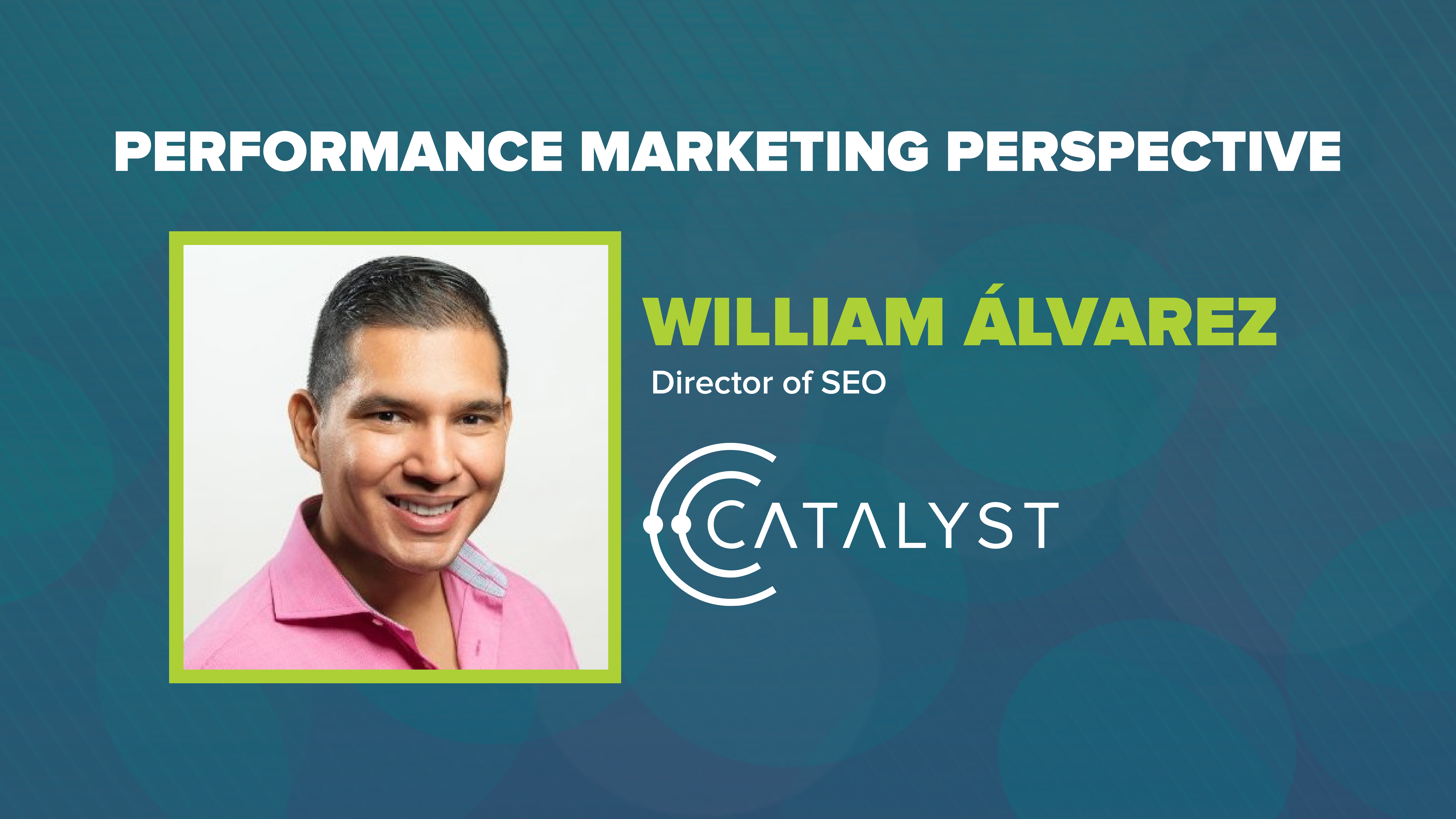Performance Marketing Perspective: Interview with Catalyst’s William Álvarez
April 30, 2020In Catalyst’s “Performance Marketing Perspective” blog series we’re interviewing thought-leaders and experts from across our team to weigh in on changes, opportunities, and challenges in performance marketing. You’ll hear from paid search directors, SEO managers, programmatic leaders, and more as we share how brands can maximize the success of their performance marketing campaigns.
Today’s post features Catalyst’s Director of SEO, William Álvarez. William oversees organic search strategy and analytics for brands across multiple industries, ensuring close alignment and integration with other digital channels including paid media. William is passionate about creativity and innovation in search. He regularly speaks at industry events and is a key member of several digital marketing communities. With more than 20 years of digital marketing experience, William has held both in-house and agency management positions. He can be found on Twitter as @williamalvarez.
Interviewer:
What are the big changes in performance marketing for 2020?
William:
The biggest trend is around data privacy. There has been a shift towards more transparency, and more responsibility. First party data is more important now. However, this trend could leave some brands shorthanded in terms of how they approach communications for consumers – they were accustomed to using that data that will no longer be available.
So, brands need to build better experiences on the platforms that they own so they can continue to grow first party data and tailor targeted campaigns in the same way or even better.
Interviewer:
Do you feel like these enhanced data privacy laws and changes might hinder growth within personalized ad experiences?
William:
Yes, so we’ll have to take a different approach.
Advertisers can’t hide what they’re doing with your information, they have to be very transparent on what they’re collecting and how it’s being used and giving users the option to opt-in to that collection. So, maybe we don’t hit roadblocks of being able to continue to enhance our targeting methods and personalize them, we just have to be better about how we’re working with them and collecting that data.
Interviewer:
What other trends are you seeing?
William:
I think there will be a big shift towards brand building – companies building stronger brands to stay away from that generic search term mindset. Having a high level of recall is going to be more important in the future. It will lead to better ownership of the search results and will reduce reliance on competitive generic terms.
Also, the aggregate of channels just keeps growing, marketers should keep an open mind and be agile in the way that they adopt new platforms because they might be important. I know there’s a lot of things out there that don’t work. Almost every day there’s a new app or a new website or a new service, but keep an eye out for the ones that might really make a difference and don’t wait for others to test. Be the first to try. Don’t wait for others to do it because you might be leaving a lot behind.
Lastly, Google has said that September this year is the deadline for websites that did not turn over to a mobile first approach. So, if you’re not there yet, please keep that in mind. You have to move there because the world is mobile today.
Interviewer:
Where do you see voice search going?
William:
It’s still in its very early stages, but it’s going to be similar to mobile in that when we started saying that everyone had to become mobile-first and nobody did on time. Right now there are no ways to monitor and track performance on voice interactions. It’s growing by the day, but nobody’s really paying attention yet because there is no way to parameterize it or to make specific metrics. So, there’s a bit of a black hole right now. But, it’s happening. People are using it. New generations are more comfortable with it. Kids are using it all the time, and those kids are our future consumers.
Interviewer:
If you could wave a magic wand and could make anything happen, what would be the one thing that you would do to improve digital marketing?
William:
More data and visibility from an omnichannel perspective. And, near real time reporting. Having to wait a month is too long. We need to see everything that’s happening right now, including emerging channels. This will give brands a better chance to succeed.
Interviewer:
How should marketers be thinking about their website experience and consumer experience?
William:
Google has said that if you want to perform well on organic search, do not create intrusive experiences on landing pages with lots of paid ads that take over the page because then you won’t be shown as prominently in their results because they are bad user experiences.
Advertisers have to start asking themselves “Okay. Is this the experience that we want to offer? Is this okay to use?” And this may change since many ads can now be delivered programmatically and highly personalized based on behavior and many other aspects that makes the experience better.






